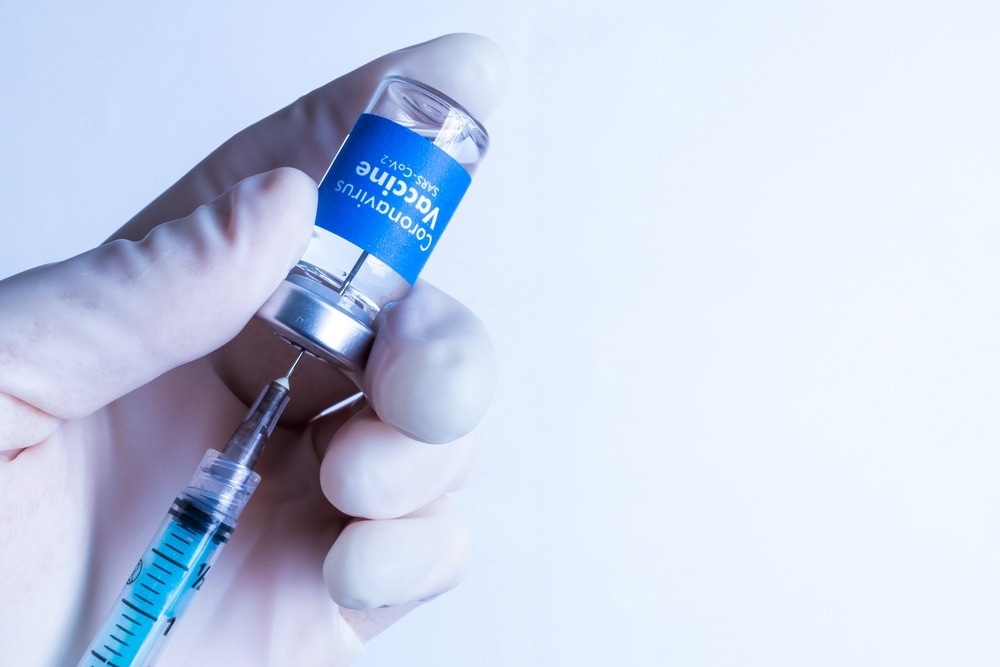In a recent study posted to the bioRxiv* preprint server, researchers developed a human endogenous retrovirus (HERV)-enveloped recombinant baculoviral deoxyribonucleic acid (DNA) vaccine to target the severe acute respiratory syndrome coronavirus 2 (SARS-CoV-2) Delta variant, and tested its cross-protection efficacy using mice models.
 Study: Baculoviral COVID-19 Delta DNA vaccine cross-protects against SARS-CoV2 variants in K18-ACE2 transgenic mice. Image Credit: Siker Stock/Shutterstock
Study: Baculoviral COVID-19 Delta DNA vaccine cross-protects against SARS-CoV2 variants in K18-ACE2 transgenic mice. Image Credit: Siker Stock/Shutterstock

 This news article was a review of a preliminary scientific report that had not undergone peer-review at the time of publication. Since its initial publication, the scientific report has now been peer reviewed and accepted for publication in a Scientific Journal. Links to the preliminary and peer-reviewed reports are available in the Sources section at the bottom of this article. View Sources
This news article was a review of a preliminary scientific report that had not undergone peer-review at the time of publication. Since its initial publication, the scientific report has now been peer reviewed and accepted for publication in a Scientific Journal. Links to the preliminary and peer-reviewed reports are available in the Sources section at the bottom of this article. View Sources
Background
The SARS-CoV-2 outbreak was declared a pandemic by the World Health Organization (WHO) in March 2020. The boost in vaccine development has helped reduce the severity and mortality due to coronavirus disease 2019 (COVID-19). However, emergent variants exhibit increased immune evasion and cause breakthrough COVID-19 in vaccinated individuals.
Developing customized vaccines against emergent variants of concern is a tedious and slow process. Therefore, it is essential to develop vaccines that exhibit cross-reactive protection against different variants of concern.
About the study
In the present study, the team modified their previously designed HERV-enveloped recombinant baculovirus-based DNA vaccine (AcHERV-COVID19S) to target the SARS-CoV-2 Delta variant.
The AcHERV-COVID19S contained a non-replicating recombinant baculovirus carrying the spike protein gene of the original SARS-CoV-2 Wuhan-Hu-1 strain. Keratin 18-human angiotensin converting enzyme-2 (ACE-2) expressing transgenic (K18-hACE2 Tg) mice were used to test the efficacy of this vaccine.
Based on the low survival rate of the AcHERV-COVID19S vaccinated K18-hACE2 Tg mice against the Delta variant, the team modified the vaccine and replaced the spike protein gene of the original SARS-CoV-2 Wuhan-Hu-1 strain with the receptor binding domain (RBD) to the S1 subunit sequence of the Delta variant (AcHERV-COVID19D). The vaccine was further modified with proline substitutions and polybasic cleavage site removal to improve the immunogenicity
Vero E6 cells inoculated with AcHERV-COVID19S and AcHERV-COVID19D were evaluated using immunofluorescence assay and Western blotting to characterize the spike-specific antigen expression.
Six K18-hACE2 Tg mice were inoculated with the AcHERV-COVID19S and AcHERV-COVID19D vaccines and challenged with SARS-CoV-2 Wuhan-Hu-1 and the Delta variants to test the prophylactic effect of the vaccine. Histopathological analysis was carried out on the lungs of the euthanized mice after seven days, and viral titers were measured. Neutralizing antibody titers from the immunized mice were compared.
Additionally, C57 black 6 (C57BL/6) mice were inoculated with the vaccines to measure the cellular effects of vaccine-induced immunity. Enzyme-linked immunosorbent spot (ELISpot) assays were used to analyze the levels of interferon-γ-secreting splenocytes. T-helper 1 and T-helper 2 type cytokines were measured using quantitative reverser transcription polymerase chain reaction (qRT-PCR).
To test the cross-reactivity of the AcHERV-COVID19D, the immunized and control group (non-vaccinated) mice were also challenged with the Omicron variant of SARS-CoV-2. A replication-incompetent adenoviral vector carrying the spike proteins of the SARS-CoV-2 Wuhan-Hu-1 and Delta variants was also tested on the mice.
Results
The results indicated that the mice vaccinated with AcHERV-COVID19S showed 100% survival when challenged with the SARS-CoV-2 Wuhan-Hu-1 strain but only 50% survival against the Delta variant infection. However, the AcHERV-COVID19D vaccine conferred 100% protection in mice challenged with the SARS-CoV-2 Delta and Omicron variants.
The removal of polybasic cleavage sites in the AcHERV-COVID19D resulted in a strong cellular and humoral immune response compared to the original AcHERV-COVID19S vaccine. The cross-reactivity to the Omicron variant indicated the involvement of cellular and humoral immunity.
Although the adenoviral vector vaccine also showed 100% survival in the mice challenged with the Omicron variant, it caused cellular toxicity because the vector expressed all the adenoviral genes except the viral replication gene. In contrast, the baculovirus gene promoters are not recognized by the ribonucleic acid (RNA) polymerases, making the baculoviral vector safer.
Histopathological analysis after challenge with the Delta variant indicated high traces of the virus in the lung tissues of mice vaccinated with the AcHERV-COVID19S vaccine but no detectable viral titers in the lungs of the AcHERV-COVID19D vaccinated mice.
Conclusion
Overall, the AcHERV-COVID19D vaccine developed from the modified AcHERV-COVID19S vaccine elicited a robust humoral and cellular immune response and exhibited cross-protection against the SARS-CoV-2 Omicron variant and 100% protection against the Delta variant.
Compared to other viral vectors, the baculovirus was safe as the baculoviral genes are not expressed by the vector and do not cause cellular toxicity. The cross-reactivity and safety of the AcHERV-COVID19D vaccine make it a promising candidate vaccine against the emergent SARS-CoV-2 variants of concern.

 This news article was a review of a preliminary scientific report that had not undergone peer-review at the time of publication. Since its initial publication, the scientific report has now been peer reviewed and accepted for publication in a Scientific Journal. Links to the preliminary and peer-reviewed reports are available in the Sources section at the bottom of this article. View Sources
This news article was a review of a preliminary scientific report that had not undergone peer-review at the time of publication. Since its initial publication, the scientific report has now been peer reviewed and accepted for publication in a Scientific Journal. Links to the preliminary and peer-reviewed reports are available in the Sources section at the bottom of this article. View Sources